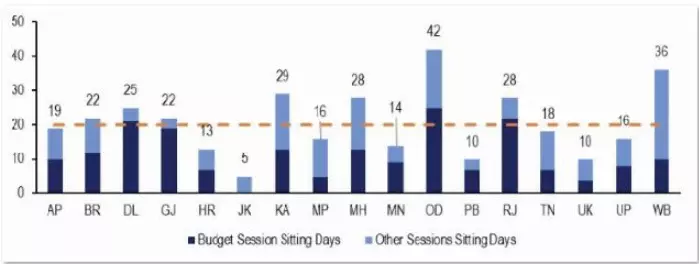State legislatures rush 500+ Bills in 2024 as sitting days, scrutiny decline: Report

New Delhi: Indian state legislatures enacted over 500 Bills in the year 2024 while examining total Budgets of over Rs 58 lakh crore, reports the fifth annual ‘Review of State Laws’ done by PRS Legislative Research. The report, examining 31 state legislatures, highlighted ongoing issues regarding lesser legislative discussion and a continued slide in the number of days Assemblies sit each year.
State legislatures, in 2024, convened for a combined average of 20 days, with each session of about five hours. Odisha had the maximum number of sitting days at 42, followed by Kerala (38) and West Bengal (25). Jammu and Kashmir had the least, whereas bigger states such as Uttar Pradesh and Madhya Pradesh only met for 16 days. Debates on state budgets—a fundamental legislative duty—averaged a mere seven days per legislature.
The data reveals a long-term decline in legislative engagement. In 2017, Assemblies met for 28 days on average, plummeting to 16 days in 2020 due to the COVID-19 pandemic. Although sessions recovered partially after the pandemic, the average has remained stuck at about 20 days since 2021. Kerala, Odisha, and Karnataka had comparatively higher averages of 44, 40, and 34 sitting days, respectively, between 2017 and 2024. Although some states established minimum sitting targets through legislation, none of them followed these standards. Legislative productivity ranged widely, with Karnataka topping the list with 49 Bills enacted, followed by Tamil Nadu (45). Delhi and Rajasthan enacted only one and two Bills, respectively. More than 51 per cent of all Bills were enacted on the day of introduction, with eight states enacting each Bill within 24 hours of tabling—a trend already seen in Jharkhand, Mizoram, Puducherry, and Punjab.
PRS Legislative Research conducts policy analysis for legislators, stressing the necessity of vigorous deliberation to guarantee that legislation fits democratic accountability.
Constitutional requirements were also short of fulfilment. The deputy speaker’s office, as mandated under Article 178, was vacant in eight states including Jharkhand, which has not had one for more than two decades. The Lok Sabha too had no deputy speaker since 2019, facing criticism from constitutional analysts.
State legislature-Governor tensions over delayed assent to Bills continued, even after a Supreme Court directive for timelines for gubernatorial approval. PRS data reflected continued delay in 2024, holding up major legislation.
Thematic analysis revealed that close to half of laws in 2024 were on education, finance, and local government. Uttarakhand was the first state to implement a Uniform Civil Code, and West Bengal passed the Aparajita Act, enhancing punishment for offences such as rape. Some states, such as Haryana and Madhya Pradesh, focused on private education reform, limiting fees and coaching centres. Maharashtra reserved 10 per cent of government employment and education places for Marathas, and Tamil Nadu allocated welfare funds for SC/ST groups in proportion to their populations. After a July 2024 Supreme Court decision granting states permission to tax mineral rights, various Assemblies proceeded to capitalise on this revenue authority. Gujarat and Assam prohibited black magic and “magical healing,” while Maharashtra increased fines on illicit tree felling. Karnataka, Haryana, and Telangana placed bans on hookah bars. Reforms in agricultural marketing also experienced changes in states such as Chhattisgarh, Punjab, and Tamil Nadu. Even with legislative action, the report raised alarms about quality of scrutiny and dwindling debate hours. With vital laws being hurried through legislatures—sometimes in a single day—doubts remain about whether legislatures are performing their constitutional mandate to deliberate vigorously and serve the public interest.



